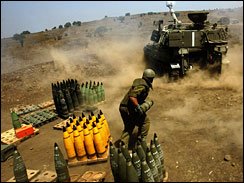The Media's Double Standard in Lebanon

Despite the urgings of one anonymous commenter to this blog, I have not been following the Israel-Hezbollah conflict much, mostly because it seems to be one of those depressingly unavoidable things which occurs every so often. However, in perusing the media coverage of the conflict, I find something very troubling. The coverage seems to focus on civilian casualties inflicted by Israel in Lebanon. I find this focus highly suspect, for a number of reasons.
First, civilian casualties are an inevitable by-product of any military conflict. However, with few exceptions, such as Germany's bombing of London and the U.S. firebombing of Dresden and Tokyo in World War II, followed by the U.S. nuclear bombing of the Japanese cities of Hiroshima and Nagasaki, intelligent countries in the modern age typically do not deliberately target civilians. The reason is the very reason we see today -- to do so would result in the ultimate bad press, which would turn world opinion against them. Israel has a track record of taking extra steps, such as house-to-house searches, putting its soldiers in greater peril, in order to avoid civilian casualties. Hezbollah and other terrorists have capitalized on this by hiding themselves and their weapons among civilians in order to put Israel between the scylla and charybdis of either not going after them, or going after them and unintentionally inflicting civilian casualties in the process. Israel has also dropped billions of leaflets telling civilians to get out of the way because Israeli soliders are coming after the Hezbollah. Of course, there are individual cases where countries have failed to meet this standard. However, the media in the Israel-Hezbollah conflict seem to be falsely implying that Israel is either deliberately targeting civilians in Lebanon or recklessly disregarding their safety. Here's just one example: a BBC article from July 15 dubiously titled "Israel Kills Lebanese Civilians."
In contrast to the way countries such as Israel conduct themselves, Hezbollah, Hamas and other terrorist groups deliberately launch terrorist attacks against civilians, to gain media attention and achieve longer-term political goals. In particular, Hezbollah has for years launched thousands of rocket attacks targeting civilians in Israel. These rocket attacks emanate from southern Lebanon. To equate terrorists' deliberate targeting of civilians with unintended civilian casualties caused by the country defending itself against the terrorists is immoral.
International law recognizes that nations have the right to defend themselves with military force if attacked or faced with an imminent attack. Under these standards, Israel has the right to go into southern Lebanon and attack the Hezbollah who have been attacking Israel. That is what Israel is doing. That is what the U.S. would do if terrorists in Mexico or Canada or Cuba regularly fired rockets at U.S. civilans. That is what President John F. Kennedy did when he ordered the U.S. Navy to blockade Cuba and nearly went to nuclear war against the Soviet Union in the 1962 Cuban Missile Crisis after detecting Russian missiles that had been placed in Cuba and not even fired at the U.S.
President Bush said one thing that was correct after 9/11. He said that nations that harbor terrorists should be held responsible, just as the terrorists themselves. Unfortunately, other than invading Afghanistan to go after the Taliban and Al Quaeda for a short while after 9/11, Bush has not enforced this doctrine. If he did, the U.S. might have invaded Iran and Syria, two countries that are known to host and support terrorists such as Hezbollah, instead of invading Iraq, which was not on the U.S. list of states supporting terrorism as of 9/11. Under this doctrine, Lebanon must be held responsible for permitting Hezbollah to occupy the southern part of the country and launch regular terrorist attacks against Israel. If Lebanon was under Syria's thumb or otherwise too weak to stop Hezbollah itself, it should have asked for international assistance to do so. Not having done so, Lebanon should not be surprised that Israel would cross the border to try and stop these Hezbollah attacks, as well as Hezbollah's kidnapping of Israeli soldiers.
Now, if the media want to cover civilian deaths and injuries in the Israel-Hezbollah conflict in order to sensationalize the news, or perhaps to publicize the humanitarian plight of civilians in wartime and turn people against wars, that's fine. But if that is the case, where have the media been in Iraq? How much video footage of dead and injured Iraqi civilians have we seen as a result of the U.S. invasion and occupation of Iraq? According to the rather limited statistics, the number of dead Iraqi civilians as a result of the U.S. invasion is staggering, possibly exceeding 100,000. The number of wounded Iraqi civilians must be thousands more. But we rarely if ever see the bloody video footage. We also do not see the footage of dead and wounded U.S. troops for that matter. If there was any proportion to the Israel-Hezbollah conflict, we would be seeing hours of bloody Iraqi dead and wounded civilians every day, and there would be riots in U.S. streets against the Iraq War, which, in contrast to Israel's military action against Hezbollah, is not the result of an Iraqi attack on the U.S. What's going on here?
It seems to me that there are two possibilities as to why the media are applying a double standard to Israel in its war against Hezbollah. The first possibility is that the media has greater access in this war than it does in Iraq. Israel is an open society that allows the press to cover it, even when engaging in military action. There were several days of video footage of Israeli tanks and armored vehicles lined up on the road near the border of Lebanon. There was also footage of Israeli troops firing shells at Hezbollah targets in southern Lebanon, including close-ups of stacks of shells standing on end, so educated viewers, including the enemy, could identify exactly what Israel was firing and how much. And finally, there is lots of footage of civilian casualties, including CNN's airing of a burned boy in a Lebanese hospital. When was the last time we saw that kind of detail in the Iraq War? The U.S. government censors media coverage in Iraq, and does not even permit the media to film or photograph flag-draped caskets of dead U.S. soldiers being off-loaded at Dover Air Force Base in Delaware. The same media who seem to be relishing coverage of civilian casualties in Lebanon are completely docile in their restricted coverage of Iraq.
The other possibility why the media are applying a double standard to Israel in covering civilian war casualties is that the media, and much of the world, do not like Israel. Is it because of age-old anti-semitism? Is it because terrorists and other enemies of Israel are good at using the media to manipulate world opinion? In this regard, much of the emotion coming from this conflict is from people who are understandibly reacting to emotional and very disturbing pictures that they see on television. But there are other emotional pictures that they could see on television, such as the war and humanitarian crisis in Darfur, Sudan, if the media decided to send huge teams of reporters and camera crews there, as CNN and other networks have done with the Israel-Hezbollah conflict.
One thing this blog has consistently done is to try to get readers to step back from the surface of things they see, hear and read in the media, and to think critically about what is being served to them, how, and why. As I said at the end of an earlier post, that is where the truth can be found.
Fire away.




6 Comments:
If you had been following the story from the beginning, you would know that the media coverage focused much more on Israel's civilian casualties in the beginning. One story that comes to mind is the one of the 3 year old and 9 year old that were killed. I believe the switch to discussing Lebanon's struggle came as backlash.
Lebanon is too weak to rid itself of Hezbollah and has asked repeatedly for international help. At one point several years ago, the US even promised support and aid that never came to fruition.
And Israel being hated? The US aligns itself with Israel no matter what, and I still don't understand the cause of that particular alliance.
I don't think anti-semitism is behind this particular media coverage. I believe that we are positioning ourselves to go after Iran and possibly others. If the current crisis can create outrage ("Oh look at poor Lebanon-it's Iran and Syria's fault"), the American public may be more open to supporting Bush's agenda of going after Iran.
So it's the U.S. fault that Lebanon is home to Hezbollah? After 241 Marines were blown up in their barracks by Hezbollah in 1983, trying to keep the peace there? And now, with the U.S. Government suppporting Israel, the turning of media, world, U.S. public and U.N. opinion against Israel's Hezbollah battle will somehow lead to the view that the Lebanon situation is Iran and Syria's fault? And will increase support for the U.S. policy to attack Iran and Syria? Sorry, but I think you have it exactly backwards.
Matt, you have it exactly right. In it's previous 5 wars, the world and world press have shown the same bias as they are exhibiting right now. We can lose a war and survive; Israel's loss would result in extinction. They must and will survive, despite the NY Times, CNN, BBC and others.
Well said!
When it comes to using overwhelming force to fight terrorists and other enemies or the countries who host them, when those terrorists or enemies attack another country first, you'll find me a complete hawk. When it comes to attacking countries and replacing leaders who did not attack or threaten to attack first, and then inventing the flimsiest of post hoc rationales, you'll find me a relentless critic. When it comes to criticizing particular media outlets on one issue in a thinly veiled attempt to tarnish them over a broader political agenda, you'll find me loudly calling foul.
So let me get this straight...you believe Israel responded appropriately? Yes, Hezbollah struck first by kidnapping two soldiers. Israel's response to that was to bomb southern Lebanon with numerous casualties. Appropriate?
No, Hezbollah struck first by firing rockets at Israeli civilians for 25 years, THEN kidnapping Israeli soldiers. I think Israel's response is appropriate and long overdue. I call upon them to attack their targets as carefully as possible, but the danger of inadvertently causing civilian casualties in defending one's country, as unfortunate as it is, cannot legitimately be used as an excuse by others to call on the nation not to defend itself at all. That's exactly what Hezbollah and other terrorists hope for when they most cowardly hide themselves and their weapons among civilian populations, even, reportedly and most perversely, in mosques.
Post a Comment
<< Home